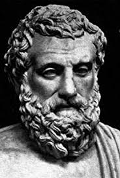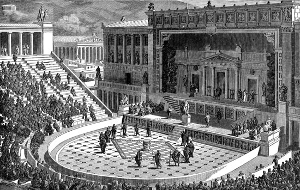Sophocles: Master of Greek Tragedy
One of the most well-known playwrights from Ancient Greek times was Sophocles. He wrote more than 120 plays, but only a handful survive. 
Born about 496 B.C. in Colonus (a village outside Athens), Sophocles benefited from his family's wealth and the resulting extensive education. He took to writing tragedies and proved to be an expert at it. His musical ability was strong as well, and Sophocles found himself chosen to lead the paean that celebrated the Greek victory at the Battle of Salamis. His first glimmer of everlasting fame was winning the tragedy prize at City Dionysia in 468 B.C., besting perennial champion Aeschylus in the process. Sophocles went on to win a total of 24 first prizes at the annual drama festivals, the City Dionysia and the Lenaea; he is thought to have entered 30 times in all and, many sources say, never finished lower than second. Sophocles' most famous output is a set of three plays featuring the family of Oedipus: Oedipus Rex, Oedipus at Colonus, and Antigone. They are technically not a trilogy–for a few reasons, most notably that Oedipus doesn't appear at all in Antigone. Other surviving entire plays written by him include Ajax, Electra, Philoctetes, and The Women of Trachis. The number of fragmentary plays known to have been written by Sophocles is more than 120. Following in Aeschylus's footsteps, he added another actor to the stage. Greek drama had originally had a chorus and then an actor; Aeschylus had added a second actor. Sophocles added the third actor, the tritagonist. 
He is also thought to have invented scene paintings and to have increased the size of the Chorus, from 12 to 15. Sophocles held government posts in Athens. He served as a Treasurer of Athena in 443 B.C., helping to administer the treasury of the Delian League, and was elected as a strategos, one of the top 10 generals, in 440 B.C. He was also, at age 83, a proboulous, an advisory commissioner operating in the aftermath of the defeat of Athens at Syracuse in 413, during the Peloponnesian War. He died in 406 B.C. He was 90. A son, Iophon, and grandson, Sophocles, were also playwrights.
|
|
Social Studies for Kids
copyright 2002–2026
David White




